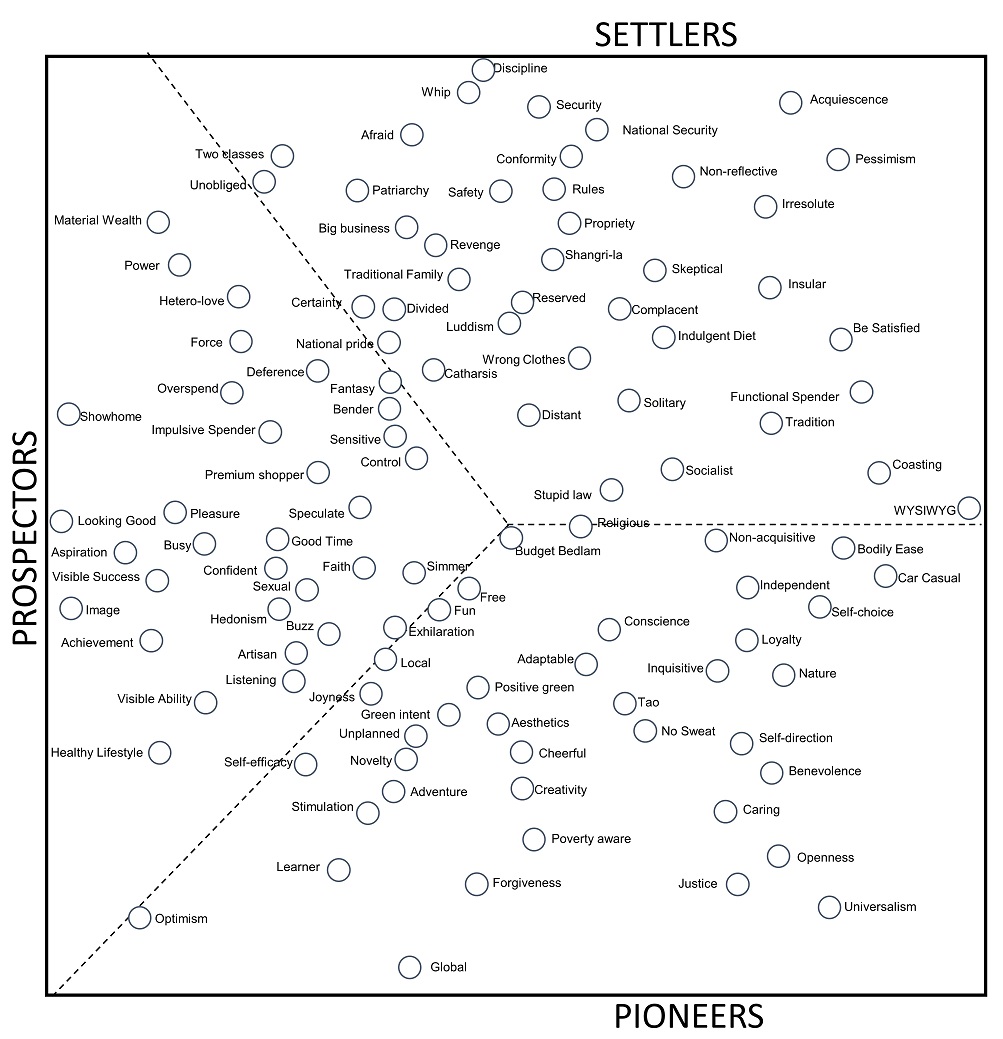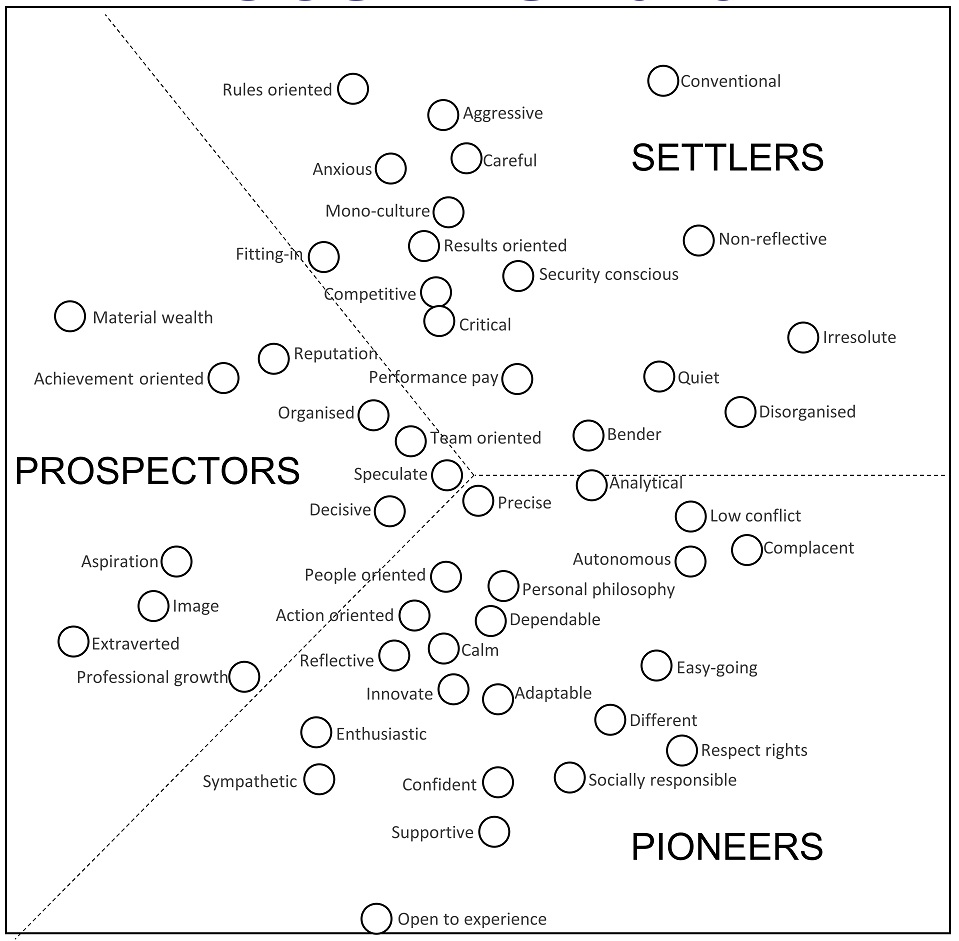

Are people’s values different at work than they are at home?
The short answer is “no”.
People’s values are deep set, relatively consistent and change only slowly over time.
CDSM’s national values surveys measure the values systems of people in 104 different ways. The results are remarkably consistent over time, i.e. relatively little change from year to year. This is a reflection of the slow (years rather than minutes or days) and consistent change that occurs in individuals’ values systems and, by extension, the cultures within which they live and work.
What is true is that people value different modes of thought and behaviour in different contexts – but within the framework of their own values systems.
For example, here on the CDSM site there are a lot of articles and papers that relate to culture and politics. Though interesting to social researchers and possibly to high level strategy and policy decision makers in their work environment, it is not necessarily something the average person gives much consideration to in their work place – or even feels comfortable discussing in that context.
To most people, politics and questions about where society is going are only issues to discuss at home, in the pub, or in general conversation with friends and family. These conversations often arouse great emotions, i.e. they have a basis in people’s values systems. The things that truly engage people in these discussions are driven by their values systems.
We measure what engages emotions at work by using two overlapping systems. The first is through the measurement of whole values systems (individual and national) using our 104 Attributes (see our Values Alphabet). This gives a superb insight into the motivations and frames that people with different Maslow Groups and Values Modes use - and are effective when used on them - to change or reinforce existing thoughts and behaviours.
We map these Attributes to show how they relate to the Maslow Groups, as shown below.

Using the same values surveys we are able to expand this understanding of personal values systems to gain deeper insights into what people value at work – a different context. The individual values of people can be directly correlated with work factors that are not relevant at home, in the pub and in more general conversation outside work.
Much has been written, directly or indirectly, by CDSM and others about the Attributes in the national cultural values map but this is the first time we have published a picture of the work-related elements in a form that is directly comparable to the national map. In other words, factors that are important to the different Maslow Groups and Values Modes are shown in the same perspective so that comparisons can easily be made between what motivates people at work and within their whole life.
It shows that the nature of what people value at work is clearly correlated with their whole values system.
Again, we map these various work-related elements into the same space as the Attributes, as shown below.

This ‘Values and Organisational Cultures Styles’ (VOCS) map includes 31 factors specifically relating to aspects of organizational culture that motivate, or demotivate, thoughts and behaviours at work. There are 10 factors that measure different aspects of personality, as defined by the well-respected Big 5 – or OCEAN - system. These are joined by a short selection of relevant Attributes found in the national surveys.
Only working people are asked their opinion on these 50 questions and statements, responding through 6-point Lickert scales. Their responses give the form to the VOCS map – from which clients, assisted by CDSM, can begin the process of comparing this benchmark to the values and cultures of their own organizations.
Even a quick glance will show how the different elements segment by Maslow Group – with ‘Respect rights’ and ‘Supportive’ being solidly located within the Pioneer sector of the VOCS map, while ‘Material wealth’ and ‘Aspiration’ are located within the Prospector sector; and ‘Aggressive’ and ‘Mono-culture’ are firmly within the Settler area.
As a simple example of how this can be used to understand what is really going on within an organizational culture let’s think about the implications of ‘supportive’ policies and procedures within an organization. Surely this is welcome by all?
The VOCS data shows that this is an important factor to Pioneers and not as important to Prospectors – and the positioning of ‘Supportive’ almost directly opposite the Settlers' ‘Aggressive’ gives an indication that Settlers and Pioneers will have very different ideas about what is valued at work.
The implication is that policies that are designed to be supportive of all (the basis for diversity in the work place) can be perceived at a deep level, the level of values, to be a threat to Settlers. The things they value are rooted in a desire to work in a mono-culture – “a place for people like me” – which is to be defended aggressively if needs be.
This type of culture clash is exhibited in almost all organisations and is manifested in the seemingly intractable issues related to gender, inequality, race, age, etc. These issues are often a function of two or more different values-based interpretations of the implications of proposed policies and behaviours. What seems sensible to one Maslow Group may seem outrageous and unacceptable to other Maslow Groups.
Through a basic understanding of personal values and the types of behaviours valued in the working environment, through the use of VOCS methods, a new language – the language of values – can reframe problems into solutions in a way that gains buy-in from people with very different outlooks on the world.